Organisational Behaviour: Culture, Motivation and Team Performance
VerifiedAdded on 2023/06/07
|14
|4642
|411
Report
AI Summary
This report provides an in-depth analysis of organisational behaviour, focusing on the influence of organisational culture, politics, and power on individual and team performance within Marks & Spencer. It evaluates content and process theories of motivation, such as McClelland's theory, Maslow's hierarchy of needs, Herzberg's two-factor theory, Vroom's expectancy theory, Adam's equity theory, and Skinner's reinforcement theory, and how these theories enable effective goal achievement. The report further explores the characteristics of effective teams versus ineffective teams and applies organisational behaviour concepts and philosophies within the context of Marks & Spencer, examining team and group development theories to support cooperation. Ultimately, the analysis evaluates the relevance of team development theories and concepts in improving business performance and productivity, providing justified recommendations for organisational success. Desklib provides a platform to access similar solved assignments and study resources for students.
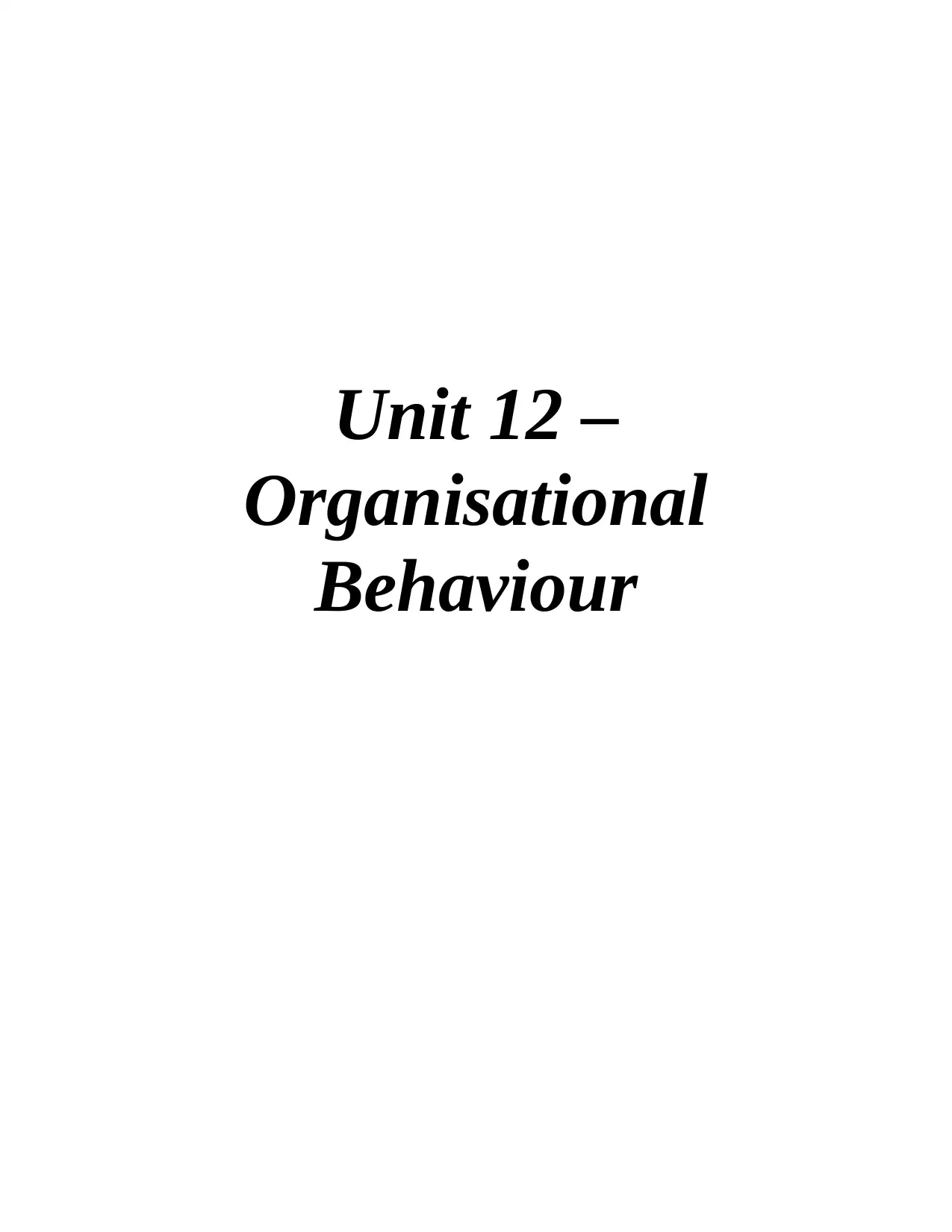
Unit 12 –
Organisational
Behaviour
Organisational
Behaviour
Paraphrase This Document
Need a fresh take? Get an instant paraphrase of this document with our AI Paraphraser
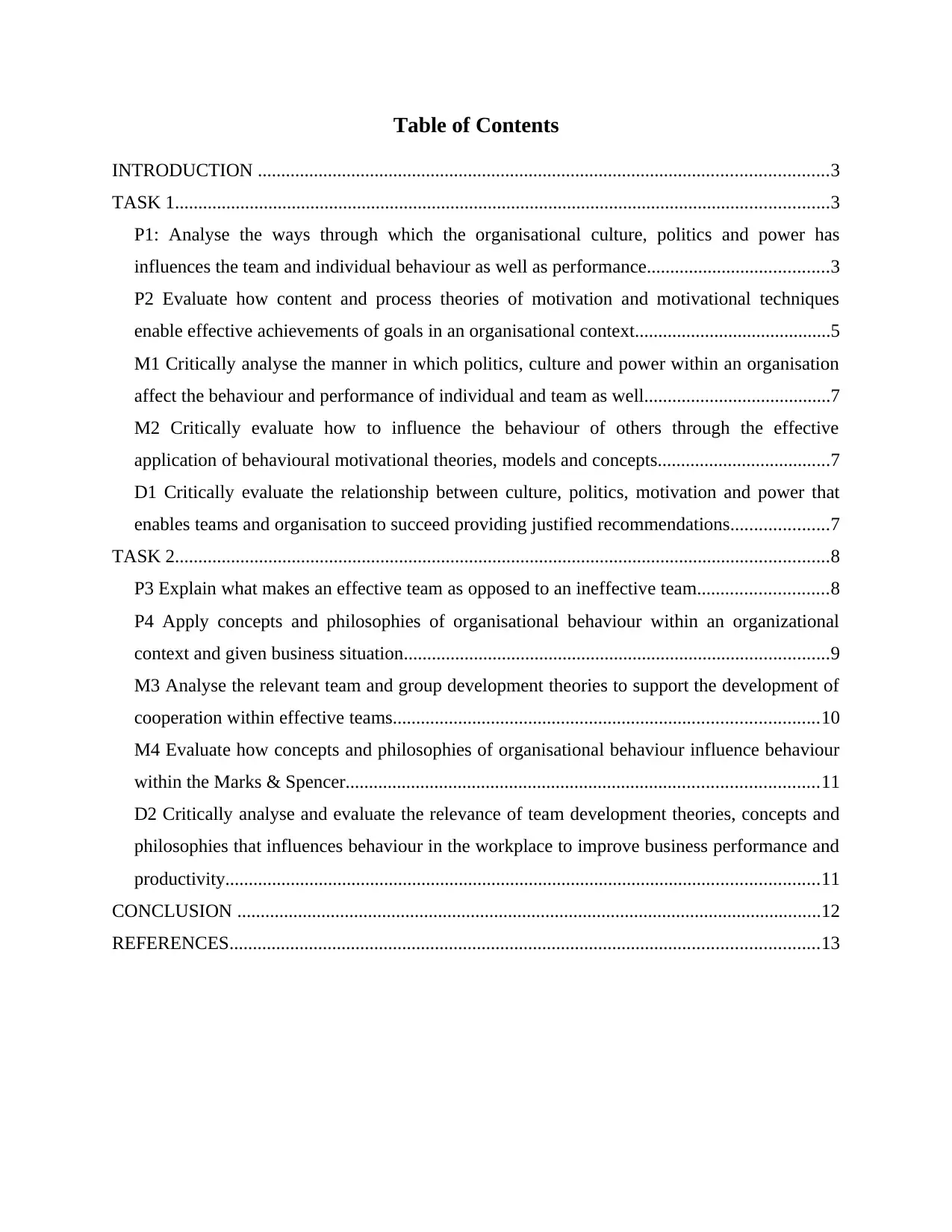
Table of Contents
INTRODUCTION ..........................................................................................................................3
TASK 1............................................................................................................................................3
P1: Analyse the ways through which the organisational culture, politics and power has
influences the team and individual behaviour as well as performance.......................................3
P2 Evaluate how content and process theories of motivation and motivational techniques
enable effective achievements of goals in an organisational context..........................................5
M1 Critically analyse the manner in which politics, culture and power within an organisation
affect the behaviour and performance of individual and team as well........................................7
M2 Critically evaluate how to influence the behaviour of others through the effective
application of behavioural motivational theories, models and concepts.....................................7
D1 Critically evaluate the relationship between culture, politics, motivation and power that
enables teams and organisation to succeed providing justified recommendations.....................7
TASK 2............................................................................................................................................8
P3 Explain what makes an effective team as opposed to an ineffective team............................8
P4 Apply concepts and philosophies of organisational behaviour within an organizational
context and given business situation...........................................................................................9
M3 Analyse the relevant team and group development theories to support the development of
cooperation within effective teams...........................................................................................10
M4 Evaluate how concepts and philosophies of organisational behaviour influence behaviour
within the Marks & Spencer.....................................................................................................11
D2 Critically analyse and evaluate the relevance of team development theories, concepts and
philosophies that influences behaviour in the workplace to improve business performance and
productivity...............................................................................................................................11
CONCLUSION .............................................................................................................................12
REFERENCES..............................................................................................................................13
INTRODUCTION ..........................................................................................................................3
TASK 1............................................................................................................................................3
P1: Analyse the ways through which the organisational culture, politics and power has
influences the team and individual behaviour as well as performance.......................................3
P2 Evaluate how content and process theories of motivation and motivational techniques
enable effective achievements of goals in an organisational context..........................................5
M1 Critically analyse the manner in which politics, culture and power within an organisation
affect the behaviour and performance of individual and team as well........................................7
M2 Critically evaluate how to influence the behaviour of others through the effective
application of behavioural motivational theories, models and concepts.....................................7
D1 Critically evaluate the relationship between culture, politics, motivation and power that
enables teams and organisation to succeed providing justified recommendations.....................7
TASK 2............................................................................................................................................8
P3 Explain what makes an effective team as opposed to an ineffective team............................8
P4 Apply concepts and philosophies of organisational behaviour within an organizational
context and given business situation...........................................................................................9
M3 Analyse the relevant team and group development theories to support the development of
cooperation within effective teams...........................................................................................10
M4 Evaluate how concepts and philosophies of organisational behaviour influence behaviour
within the Marks & Spencer.....................................................................................................11
D2 Critically analyse and evaluate the relevance of team development theories, concepts and
philosophies that influences behaviour in the workplace to improve business performance and
productivity...............................................................................................................................11
CONCLUSION .............................................................................................................................12
REFERENCES..............................................................................................................................13
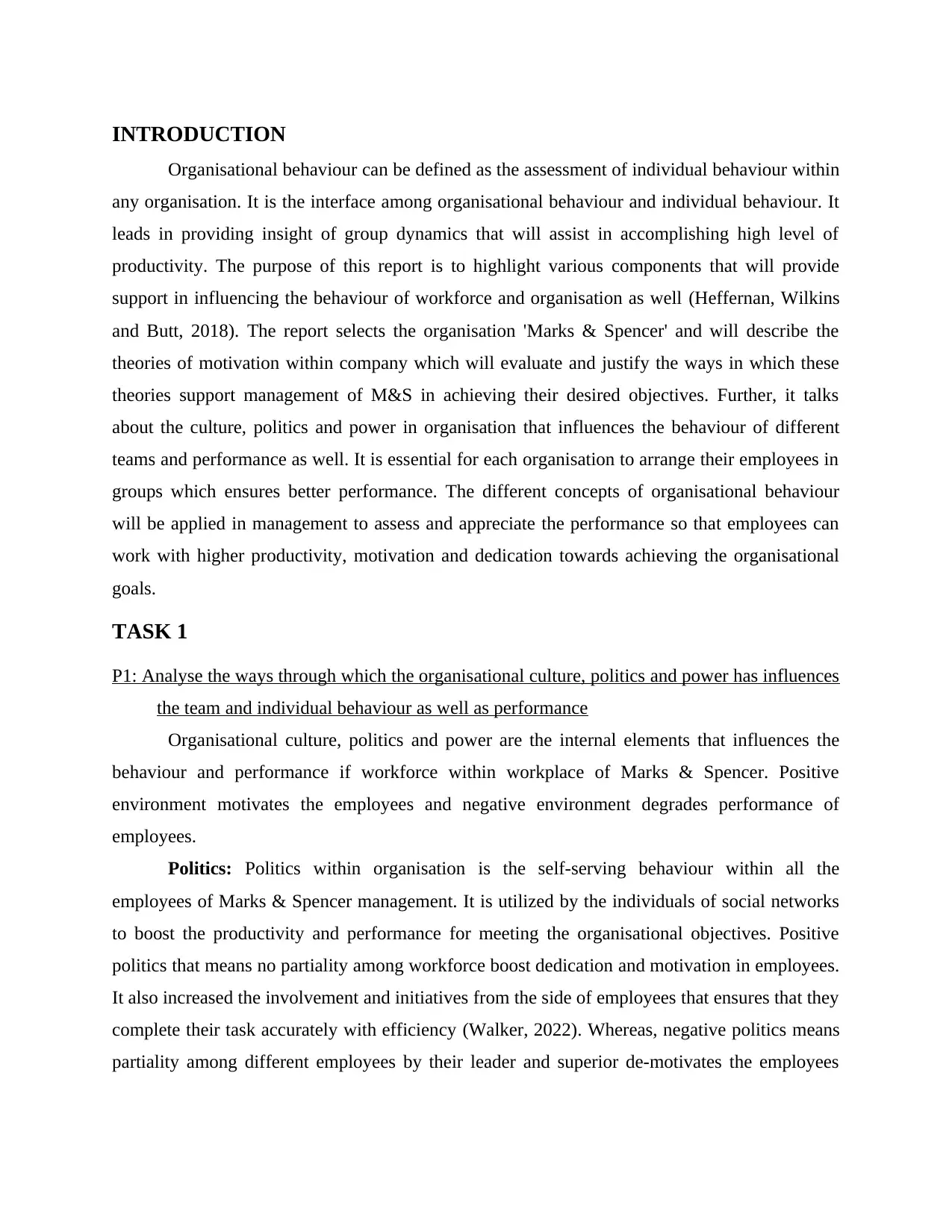
INTRODUCTION
Organisational behaviour can be defined as the assessment of individual behaviour within
any organisation. It is the interface among organisational behaviour and individual behaviour. It
leads in providing insight of group dynamics that will assist in accomplishing high level of
productivity. The purpose of this report is to highlight various components that will provide
support in influencing the behaviour of workforce and organisation as well (Heffernan, Wilkins
and Butt, 2018). The report selects the organisation 'Marks & Spencer' and will describe the
theories of motivation within company which will evaluate and justify the ways in which these
theories support management of M&S in achieving their desired objectives. Further, it talks
about the culture, politics and power in organisation that influences the behaviour of different
teams and performance as well. It is essential for each organisation to arrange their employees in
groups which ensures better performance. The different concepts of organisational behaviour
will be applied in management to assess and appreciate the performance so that employees can
work with higher productivity, motivation and dedication towards achieving the organisational
goals.
TASK 1
P1: Analyse the ways through which the organisational culture, politics and power has influences
the team and individual behaviour as well as performance
Organisational culture, politics and power are the internal elements that influences the
behaviour and performance if workforce within workplace of Marks & Spencer. Positive
environment motivates the employees and negative environment degrades performance of
employees.
Politics: Politics within organisation is the self-serving behaviour within all the
employees of Marks & Spencer management. It is utilized by the individuals of social networks
to boost the productivity and performance for meeting the organisational objectives. Positive
politics that means no partiality among workforce boost dedication and motivation in employees.
It also increased the involvement and initiatives from the side of employees that ensures that they
complete their task accurately with efficiency (Walker, 2022). Whereas, negative politics means
partiality among different employees by their leader and superior de-motivates the employees
Organisational behaviour can be defined as the assessment of individual behaviour within
any organisation. It is the interface among organisational behaviour and individual behaviour. It
leads in providing insight of group dynamics that will assist in accomplishing high level of
productivity. The purpose of this report is to highlight various components that will provide
support in influencing the behaviour of workforce and organisation as well (Heffernan, Wilkins
and Butt, 2018). The report selects the organisation 'Marks & Spencer' and will describe the
theories of motivation within company which will evaluate and justify the ways in which these
theories support management of M&S in achieving their desired objectives. Further, it talks
about the culture, politics and power in organisation that influences the behaviour of different
teams and performance as well. It is essential for each organisation to arrange their employees in
groups which ensures better performance. The different concepts of organisational behaviour
will be applied in management to assess and appreciate the performance so that employees can
work with higher productivity, motivation and dedication towards achieving the organisational
goals.
TASK 1
P1: Analyse the ways through which the organisational culture, politics and power has influences
the team and individual behaviour as well as performance
Organisational culture, politics and power are the internal elements that influences the
behaviour and performance if workforce within workplace of Marks & Spencer. Positive
environment motivates the employees and negative environment degrades performance of
employees.
Politics: Politics within organisation is the self-serving behaviour within all the
employees of Marks & Spencer management. It is utilized by the individuals of social networks
to boost the productivity and performance for meeting the organisational objectives. Positive
politics that means no partiality among workforce boost dedication and motivation in employees.
It also increased the involvement and initiatives from the side of employees that ensures that they
complete their task accurately with efficiency (Walker, 2022). Whereas, negative politics means
partiality among different employees by their leader and superior de-motivates the employees
⊘ This is a preview!⊘
Do you want full access?
Subscribe today to unlock all pages.

Trusted by 1+ million students worldwide
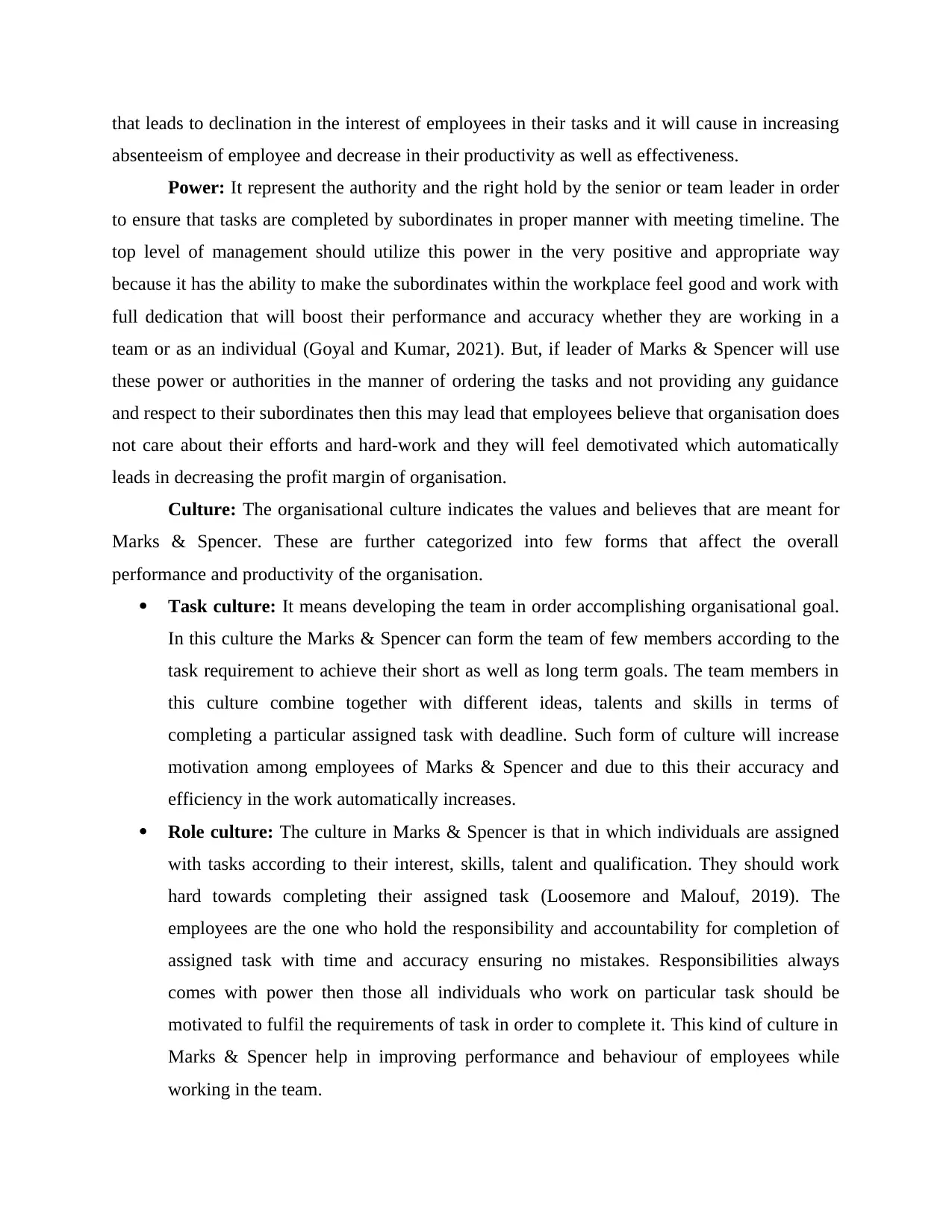
that leads to declination in the interest of employees in their tasks and it will cause in increasing
absenteeism of employee and decrease in their productivity as well as effectiveness.
Power: It represent the authority and the right hold by the senior or team leader in order
to ensure that tasks are completed by subordinates in proper manner with meeting timeline. The
top level of management should utilize this power in the very positive and appropriate way
because it has the ability to make the subordinates within the workplace feel good and work with
full dedication that will boost their performance and accuracy whether they are working in a
team or as an individual (Goyal and Kumar, 2021). But, if leader of Marks & Spencer will use
these power or authorities in the manner of ordering the tasks and not providing any guidance
and respect to their subordinates then this may lead that employees believe that organisation does
not care about their efforts and hard-work and they will feel demotivated which automatically
leads in decreasing the profit margin of organisation.
Culture: The organisational culture indicates the values and believes that are meant for
Marks & Spencer. These are further categorized into few forms that affect the overall
performance and productivity of the organisation.
Task culture: It means developing the team in order accomplishing organisational goal.
In this culture the Marks & Spencer can form the team of few members according to the
task requirement to achieve their short as well as long term goals. The team members in
this culture combine together with different ideas, talents and skills in terms of
completing a particular assigned task with deadline. Such form of culture will increase
motivation among employees of Marks & Spencer and due to this their accuracy and
efficiency in the work automatically increases.
Role culture: The culture in Marks & Spencer is that in which individuals are assigned
with tasks according to their interest, skills, talent and qualification. They should work
hard towards completing their assigned task (Loosemore and Malouf, 2019). The
employees are the one who hold the responsibility and accountability for completion of
assigned task with time and accuracy ensuring no mistakes. Responsibilities always
comes with power then those all individuals who work on particular task should be
motivated to fulfil the requirements of task in order to complete it. This kind of culture in
Marks & Spencer help in improving performance and behaviour of employees while
working in the team.
absenteeism of employee and decrease in their productivity as well as effectiveness.
Power: It represent the authority and the right hold by the senior or team leader in order
to ensure that tasks are completed by subordinates in proper manner with meeting timeline. The
top level of management should utilize this power in the very positive and appropriate way
because it has the ability to make the subordinates within the workplace feel good and work with
full dedication that will boost their performance and accuracy whether they are working in a
team or as an individual (Goyal and Kumar, 2021). But, if leader of Marks & Spencer will use
these power or authorities in the manner of ordering the tasks and not providing any guidance
and respect to their subordinates then this may lead that employees believe that organisation does
not care about their efforts and hard-work and they will feel demotivated which automatically
leads in decreasing the profit margin of organisation.
Culture: The organisational culture indicates the values and believes that are meant for
Marks & Spencer. These are further categorized into few forms that affect the overall
performance and productivity of the organisation.
Task culture: It means developing the team in order accomplishing organisational goal.
In this culture the Marks & Spencer can form the team of few members according to the
task requirement to achieve their short as well as long term goals. The team members in
this culture combine together with different ideas, talents and skills in terms of
completing a particular assigned task with deadline. Such form of culture will increase
motivation among employees of Marks & Spencer and due to this their accuracy and
efficiency in the work automatically increases.
Role culture: The culture in Marks & Spencer is that in which individuals are assigned
with tasks according to their interest, skills, talent and qualification. They should work
hard towards completing their assigned task (Loosemore and Malouf, 2019). The
employees are the one who hold the responsibility and accountability for completion of
assigned task with time and accuracy ensuring no mistakes. Responsibilities always
comes with power then those all individuals who work on particular task should be
motivated to fulfil the requirements of task in order to complete it. This kind of culture in
Marks & Spencer help in improving performance and behaviour of employees while
working in the team.
Paraphrase This Document
Need a fresh take? Get an instant paraphrase of this document with our AI Paraphraser
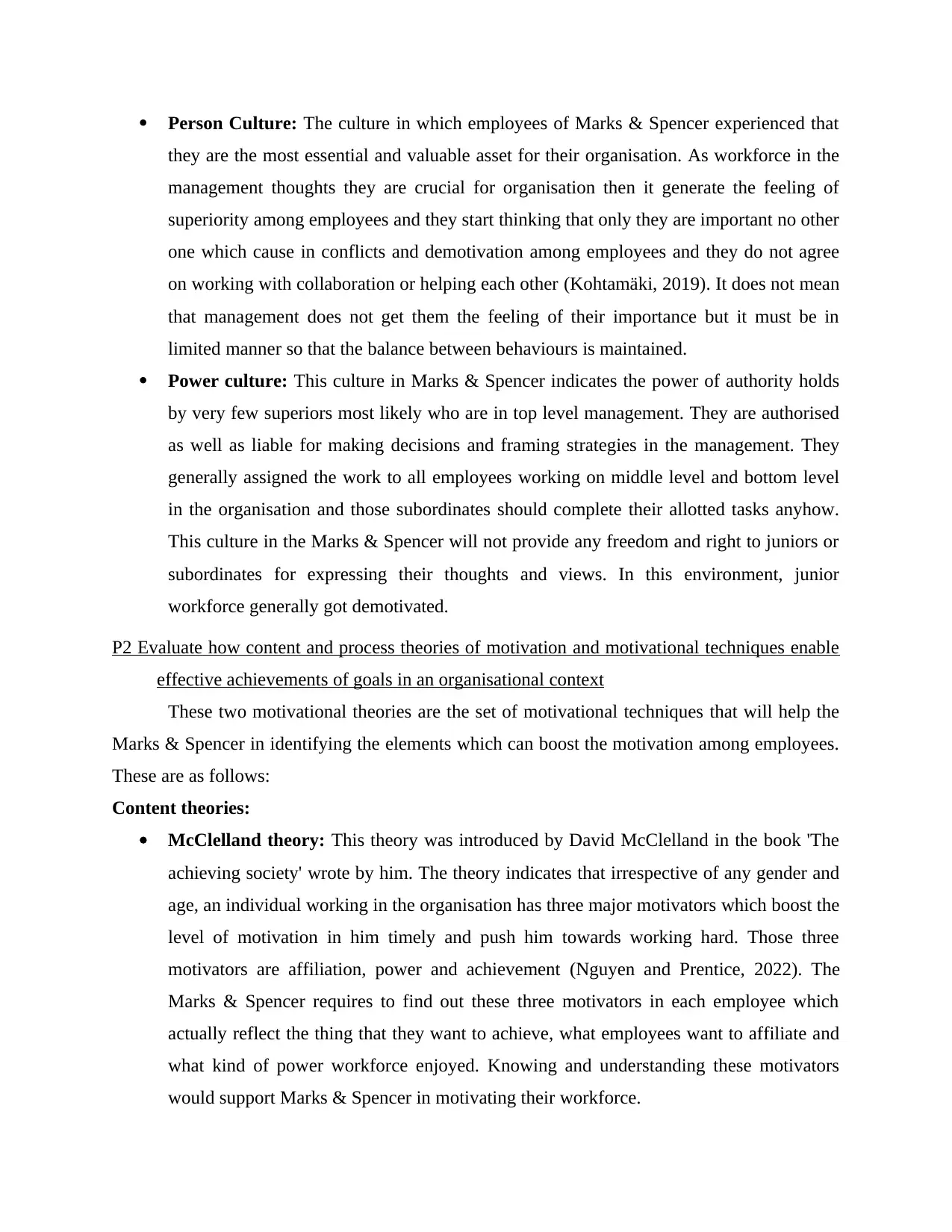
Person Culture: The culture in which employees of Marks & Spencer experienced that
they are the most essential and valuable asset for their organisation. As workforce in the
management thoughts they are crucial for organisation then it generate the feeling of
superiority among employees and they start thinking that only they are important no other
one which cause in conflicts and demotivation among employees and they do not agree
on working with collaboration or helping each other (Kohtamäki, 2019). It does not mean
that management does not get them the feeling of their importance but it must be in
limited manner so that the balance between behaviours is maintained.
Power culture: This culture in Marks & Spencer indicates the power of authority holds
by very few superiors most likely who are in top level management. They are authorised
as well as liable for making decisions and framing strategies in the management. They
generally assigned the work to all employees working on middle level and bottom level
in the organisation and those subordinates should complete their allotted tasks anyhow.
This culture in the Marks & Spencer will not provide any freedom and right to juniors or
subordinates for expressing their thoughts and views. In this environment, junior
workforce generally got demotivated.
P2 Evaluate how content and process theories of motivation and motivational techniques enable
effective achievements of goals in an organisational context
These two motivational theories are the set of motivational techniques that will help the
Marks & Spencer in identifying the elements which can boost the motivation among employees.
These are as follows:
Content theories:
McClelland theory: This theory was introduced by David McClelland in the book 'The
achieving society' wrote by him. The theory indicates that irrespective of any gender and
age, an individual working in the organisation has three major motivators which boost the
level of motivation in him timely and push him towards working hard. Those three
motivators are affiliation, power and achievement (Nguyen and Prentice, 2022). The
Marks & Spencer requires to find out these three motivators in each employee which
actually reflect the thing that they want to achieve, what employees want to affiliate and
what kind of power workforce enjoyed. Knowing and understanding these motivators
would support Marks & Spencer in motivating their workforce.
they are the most essential and valuable asset for their organisation. As workforce in the
management thoughts they are crucial for organisation then it generate the feeling of
superiority among employees and they start thinking that only they are important no other
one which cause in conflicts and demotivation among employees and they do not agree
on working with collaboration or helping each other (Kohtamäki, 2019). It does not mean
that management does not get them the feeling of their importance but it must be in
limited manner so that the balance between behaviours is maintained.
Power culture: This culture in Marks & Spencer indicates the power of authority holds
by very few superiors most likely who are in top level management. They are authorised
as well as liable for making decisions and framing strategies in the management. They
generally assigned the work to all employees working on middle level and bottom level
in the organisation and those subordinates should complete their allotted tasks anyhow.
This culture in the Marks & Spencer will not provide any freedom and right to juniors or
subordinates for expressing their thoughts and views. In this environment, junior
workforce generally got demotivated.
P2 Evaluate how content and process theories of motivation and motivational techniques enable
effective achievements of goals in an organisational context
These two motivational theories are the set of motivational techniques that will help the
Marks & Spencer in identifying the elements which can boost the motivation among employees.
These are as follows:
Content theories:
McClelland theory: This theory was introduced by David McClelland in the book 'The
achieving society' wrote by him. The theory indicates that irrespective of any gender and
age, an individual working in the organisation has three major motivators which boost the
level of motivation in him timely and push him towards working hard. Those three
motivators are affiliation, power and achievement (Nguyen and Prentice, 2022). The
Marks & Spencer requires to find out these three motivators in each employee which
actually reflect the thing that they want to achieve, what employees want to affiliate and
what kind of power workforce enjoyed. Knowing and understanding these motivators
would support Marks & Spencer in motivating their workforce.
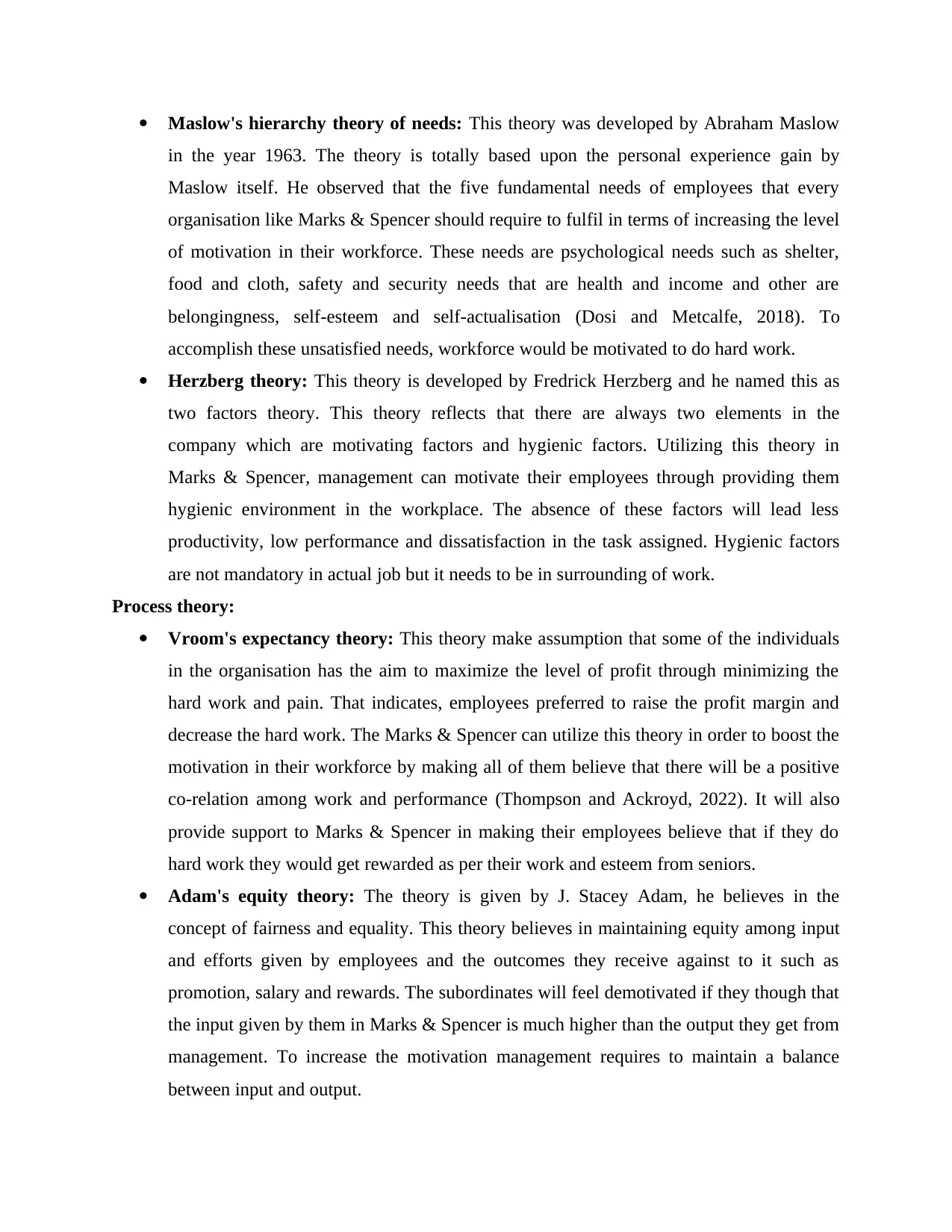
Maslow's hierarchy theory of needs: This theory was developed by Abraham Maslow
in the year 1963. The theory is totally based upon the personal experience gain by
Maslow itself. He observed that the five fundamental needs of employees that every
organisation like Marks & Spencer should require to fulfil in terms of increasing the level
of motivation in their workforce. These needs are psychological needs such as shelter,
food and cloth, safety and security needs that are health and income and other are
belongingness, self-esteem and self-actualisation (Dosi and Metcalfe, 2018). To
accomplish these unsatisfied needs, workforce would be motivated to do hard work.
Herzberg theory: This theory is developed by Fredrick Herzberg and he named this as
two factors theory. This theory reflects that there are always two elements in the
company which are motivating factors and hygienic factors. Utilizing this theory in
Marks & Spencer, management can motivate their employees through providing them
hygienic environment in the workplace. The absence of these factors will lead less
productivity, low performance and dissatisfaction in the task assigned. Hygienic factors
are not mandatory in actual job but it needs to be in surrounding of work.
Process theory:
Vroom's expectancy theory: This theory make assumption that some of the individuals
in the organisation has the aim to maximize the level of profit through minimizing the
hard work and pain. That indicates, employees preferred to raise the profit margin and
decrease the hard work. The Marks & Spencer can utilize this theory in order to boost the
motivation in their workforce by making all of them believe that there will be a positive
co-relation among work and performance (Thompson and Ackroyd, 2022). It will also
provide support to Marks & Spencer in making their employees believe that if they do
hard work they would get rewarded as per their work and esteem from seniors.
Adam's equity theory: The theory is given by J. Stacey Adam, he believes in the
concept of fairness and equality. This theory believes in maintaining equity among input
and efforts given by employees and the outcomes they receive against to it such as
promotion, salary and rewards. The subordinates will feel demotivated if they though that
the input given by them in Marks & Spencer is much higher than the output they get from
management. To increase the motivation management requires to maintain a balance
between input and output.
in the year 1963. The theory is totally based upon the personal experience gain by
Maslow itself. He observed that the five fundamental needs of employees that every
organisation like Marks & Spencer should require to fulfil in terms of increasing the level
of motivation in their workforce. These needs are psychological needs such as shelter,
food and cloth, safety and security needs that are health and income and other are
belongingness, self-esteem and self-actualisation (Dosi and Metcalfe, 2018). To
accomplish these unsatisfied needs, workforce would be motivated to do hard work.
Herzberg theory: This theory is developed by Fredrick Herzberg and he named this as
two factors theory. This theory reflects that there are always two elements in the
company which are motivating factors and hygienic factors. Utilizing this theory in
Marks & Spencer, management can motivate their employees through providing them
hygienic environment in the workplace. The absence of these factors will lead less
productivity, low performance and dissatisfaction in the task assigned. Hygienic factors
are not mandatory in actual job but it needs to be in surrounding of work.
Process theory:
Vroom's expectancy theory: This theory make assumption that some of the individuals
in the organisation has the aim to maximize the level of profit through minimizing the
hard work and pain. That indicates, employees preferred to raise the profit margin and
decrease the hard work. The Marks & Spencer can utilize this theory in order to boost the
motivation in their workforce by making all of them believe that there will be a positive
co-relation among work and performance (Thompson and Ackroyd, 2022). It will also
provide support to Marks & Spencer in making their employees believe that if they do
hard work they would get rewarded as per their work and esteem from seniors.
Adam's equity theory: The theory is given by J. Stacey Adam, he believes in the
concept of fairness and equality. This theory believes in maintaining equity among input
and efforts given by employees and the outcomes they receive against to it such as
promotion, salary and rewards. The subordinates will feel demotivated if they though that
the input given by them in Marks & Spencer is much higher than the output they get from
management. To increase the motivation management requires to maintain a balance
between input and output.
⊘ This is a preview!⊘
Do you want full access?
Subscribe today to unlock all pages.

Trusted by 1+ million students worldwide
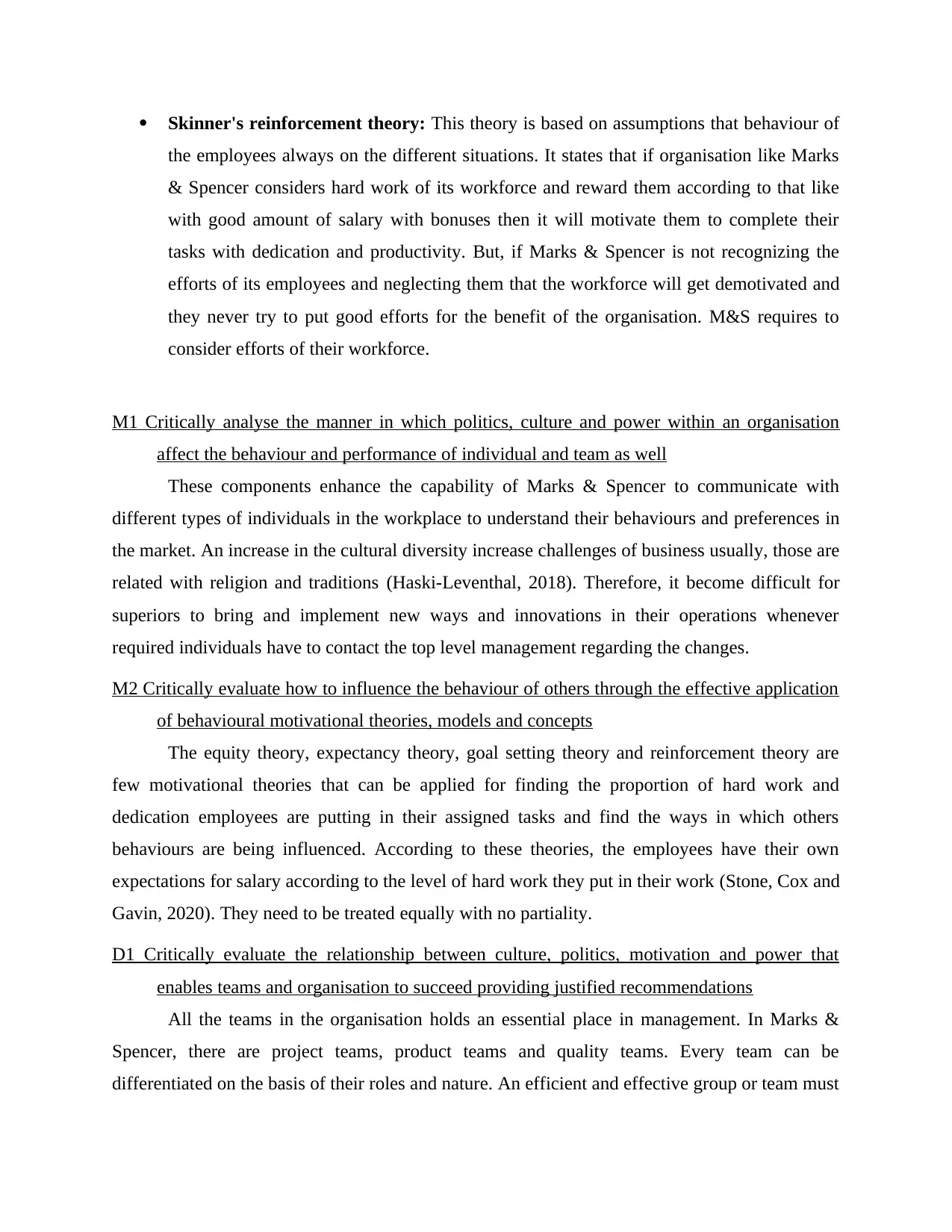
Skinner's reinforcement theory: This theory is based on assumptions that behaviour of
the employees always on the different situations. It states that if organisation like Marks
& Spencer considers hard work of its workforce and reward them according to that like
with good amount of salary with bonuses then it will motivate them to complete their
tasks with dedication and productivity. But, if Marks & Spencer is not recognizing the
efforts of its employees and neglecting them that the workforce will get demotivated and
they never try to put good efforts for the benefit of the organisation. M&S requires to
consider efforts of their workforce.
M1 Critically analyse the manner in which politics, culture and power within an organisation
affect the behaviour and performance of individual and team as well
These components enhance the capability of Marks & Spencer to communicate with
different types of individuals in the workplace to understand their behaviours and preferences in
the market. An increase in the cultural diversity increase challenges of business usually, those are
related with religion and traditions (Haski-Leventhal, 2018). Therefore, it become difficult for
superiors to bring and implement new ways and innovations in their operations whenever
required individuals have to contact the top level management regarding the changes.
M2 Critically evaluate how to influence the behaviour of others through the effective application
of behavioural motivational theories, models and concepts
The equity theory, expectancy theory, goal setting theory and reinforcement theory are
few motivational theories that can be applied for finding the proportion of hard work and
dedication employees are putting in their assigned tasks and find the ways in which others
behaviours are being influenced. According to these theories, the employees have their own
expectations for salary according to the level of hard work they put in their work (Stone, Cox and
Gavin, 2020). They need to be treated equally with no partiality.
D1 Critically evaluate the relationship between culture, politics, motivation and power that
enables teams and organisation to succeed providing justified recommendations
All the teams in the organisation holds an essential place in management. In Marks &
Spencer, there are project teams, product teams and quality teams. Every team can be
differentiated on the basis of their roles and nature. An efficient and effective group or team must
the employees always on the different situations. It states that if organisation like Marks
& Spencer considers hard work of its workforce and reward them according to that like
with good amount of salary with bonuses then it will motivate them to complete their
tasks with dedication and productivity. But, if Marks & Spencer is not recognizing the
efforts of its employees and neglecting them that the workforce will get demotivated and
they never try to put good efforts for the benefit of the organisation. M&S requires to
consider efforts of their workforce.
M1 Critically analyse the manner in which politics, culture and power within an organisation
affect the behaviour and performance of individual and team as well
These components enhance the capability of Marks & Spencer to communicate with
different types of individuals in the workplace to understand their behaviours and preferences in
the market. An increase in the cultural diversity increase challenges of business usually, those are
related with religion and traditions (Haski-Leventhal, 2018). Therefore, it become difficult for
superiors to bring and implement new ways and innovations in their operations whenever
required individuals have to contact the top level management regarding the changes.
M2 Critically evaluate how to influence the behaviour of others through the effective application
of behavioural motivational theories, models and concepts
The equity theory, expectancy theory, goal setting theory and reinforcement theory are
few motivational theories that can be applied for finding the proportion of hard work and
dedication employees are putting in their assigned tasks and find the ways in which others
behaviours are being influenced. According to these theories, the employees have their own
expectations for salary according to the level of hard work they put in their work (Stone, Cox and
Gavin, 2020). They need to be treated equally with no partiality.
D1 Critically evaluate the relationship between culture, politics, motivation and power that
enables teams and organisation to succeed providing justified recommendations
All the teams in the organisation holds an essential place in management. In Marks &
Spencer, there are project teams, product teams and quality teams. Every team can be
differentiated on the basis of their roles and nature. An efficient and effective group or team must
Paraphrase This Document
Need a fresh take? Get an instant paraphrase of this document with our AI Paraphraser
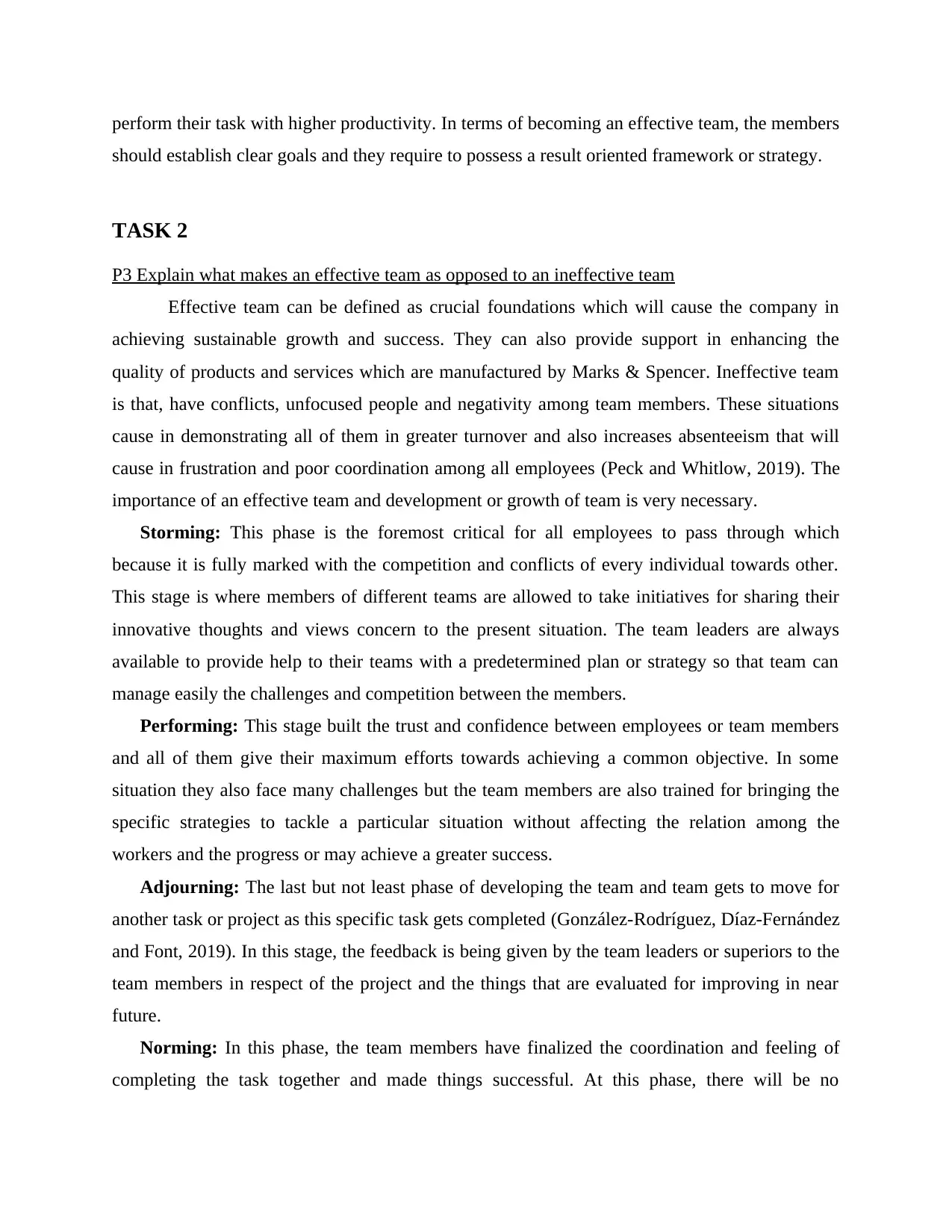
perform their task with higher productivity. In terms of becoming an effective team, the members
should establish clear goals and they require to possess a result oriented framework or strategy.
TASK 2
P3 Explain what makes an effective team as opposed to an ineffective team
Effective team can be defined as crucial foundations which will cause the company in
achieving sustainable growth and success. They can also provide support in enhancing the
quality of products and services which are manufactured by Marks & Spencer. Ineffective team
is that, have conflicts, unfocused people and negativity among team members. These situations
cause in demonstrating all of them in greater turnover and also increases absenteeism that will
cause in frustration and poor coordination among all employees (Peck and Whitlow, 2019). The
importance of an effective team and development or growth of team is very necessary.
Storming: This phase is the foremost critical for all employees to pass through which
because it is fully marked with the competition and conflicts of every individual towards other.
This stage is where members of different teams are allowed to take initiatives for sharing their
innovative thoughts and views concern to the present situation. The team leaders are always
available to provide help to their teams with a predetermined plan or strategy so that team can
manage easily the challenges and competition between the members.
Performing: This stage built the trust and confidence between employees or team members
and all of them give their maximum efforts towards achieving a common objective. In some
situation they also face many challenges but the team members are also trained for bringing the
specific strategies to tackle a particular situation without affecting the relation among the
workers and the progress or may achieve a greater success.
Adjourning: The last but not least phase of developing the team and team gets to move for
another task or project as this specific task gets completed (González-Rodríguez, Díaz-Fernández
and Font, 2019). In this stage, the feedback is being given by the team leaders or superiors to the
team members in respect of the project and the things that are evaluated for improving in near
future.
Norming: In this phase, the team members have finalized the coordination and feeling of
completing the task together and made things successful. At this phase, there will be no
should establish clear goals and they require to possess a result oriented framework or strategy.
TASK 2
P3 Explain what makes an effective team as opposed to an ineffective team
Effective team can be defined as crucial foundations which will cause the company in
achieving sustainable growth and success. They can also provide support in enhancing the
quality of products and services which are manufactured by Marks & Spencer. Ineffective team
is that, have conflicts, unfocused people and negativity among team members. These situations
cause in demonstrating all of them in greater turnover and also increases absenteeism that will
cause in frustration and poor coordination among all employees (Peck and Whitlow, 2019). The
importance of an effective team and development or growth of team is very necessary.
Storming: This phase is the foremost critical for all employees to pass through which
because it is fully marked with the competition and conflicts of every individual towards other.
This stage is where members of different teams are allowed to take initiatives for sharing their
innovative thoughts and views concern to the present situation. The team leaders are always
available to provide help to their teams with a predetermined plan or strategy so that team can
manage easily the challenges and competition between the members.
Performing: This stage built the trust and confidence between employees or team members
and all of them give their maximum efforts towards achieving a common objective. In some
situation they also face many challenges but the team members are also trained for bringing the
specific strategies to tackle a particular situation without affecting the relation among the
workers and the progress or may achieve a greater success.
Adjourning: The last but not least phase of developing the team and team gets to move for
another task or project as this specific task gets completed (González-Rodríguez, Díaz-Fernández
and Font, 2019). In this stage, the feedback is being given by the team leaders or superiors to the
team members in respect of the project and the things that are evaluated for improving in near
future.
Norming: In this phase, the team members have finalized the coordination and feeling of
completing the task together and made things successful. At this phase, there will be no
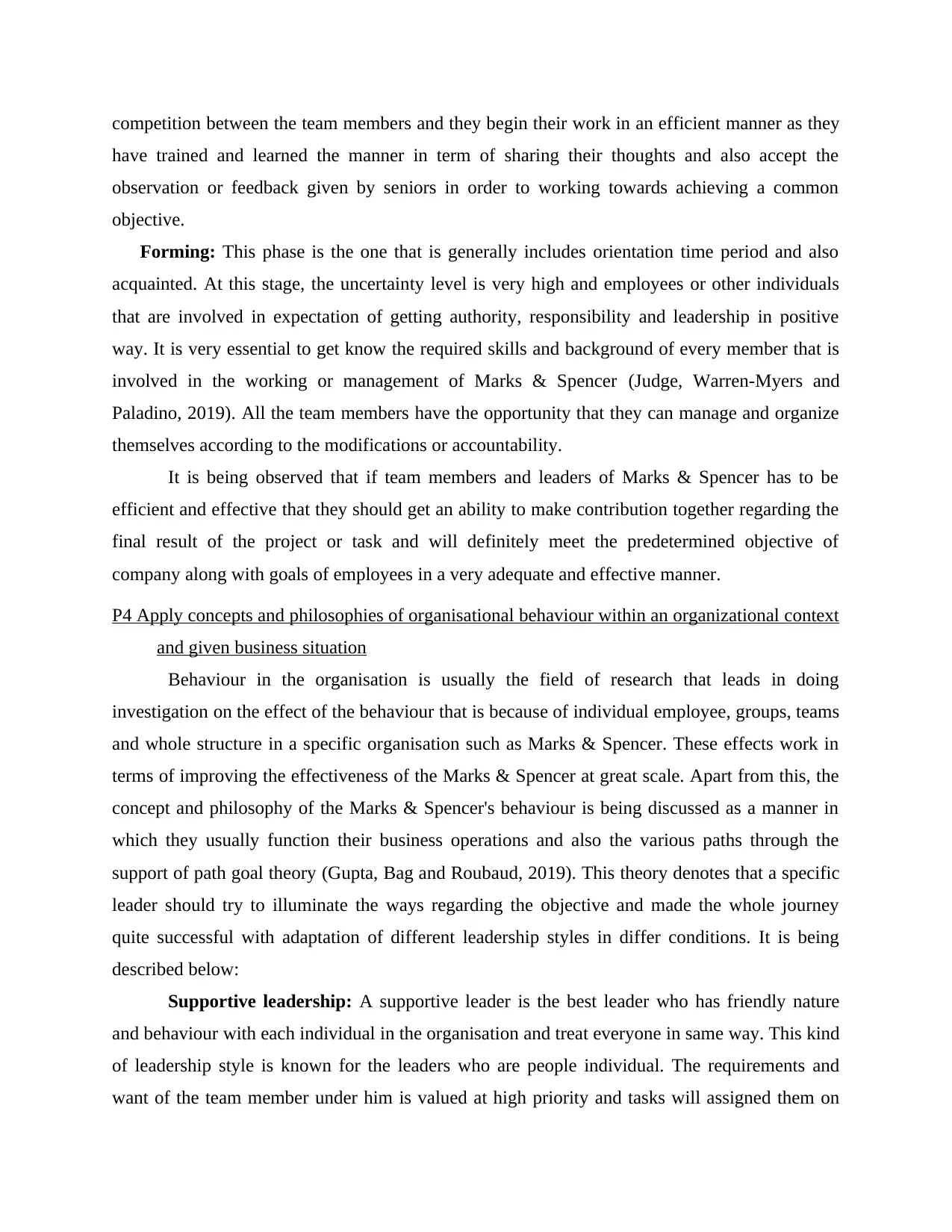
competition between the team members and they begin their work in an efficient manner as they
have trained and learned the manner in term of sharing their thoughts and also accept the
observation or feedback given by seniors in order to working towards achieving a common
objective.
Forming: This phase is the one that is generally includes orientation time period and also
acquainted. At this stage, the uncertainty level is very high and employees or other individuals
that are involved in expectation of getting authority, responsibility and leadership in positive
way. It is very essential to get know the required skills and background of every member that is
involved in the working or management of Marks & Spencer (Judge, Warren-Myers and
Paladino, 2019). All the team members have the opportunity that they can manage and organize
themselves according to the modifications or accountability.
It is being observed that if team members and leaders of Marks & Spencer has to be
efficient and effective that they should get an ability to make contribution together regarding the
final result of the project or task and will definitely meet the predetermined objective of
company along with goals of employees in a very adequate and effective manner.
P4 Apply concepts and philosophies of organisational behaviour within an organizational context
and given business situation
Behaviour in the organisation is usually the field of research that leads in doing
investigation on the effect of the behaviour that is because of individual employee, groups, teams
and whole structure in a specific organisation such as Marks & Spencer. These effects work in
terms of improving the effectiveness of the Marks & Spencer at great scale. Apart from this, the
concept and philosophy of the Marks & Spencer's behaviour is being discussed as a manner in
which they usually function their business operations and also the various paths through the
support of path goal theory (Gupta, Bag and Roubaud, 2019). This theory denotes that a specific
leader should try to illuminate the ways regarding the objective and made the whole journey
quite successful with adaptation of different leadership styles in differ conditions. It is being
described below:
Supportive leadership: A supportive leader is the best leader who has friendly nature
and behaviour with each individual in the organisation and treat everyone in same way. This kind
of leadership style is known for the leaders who are people individual. The requirements and
want of the team member under him is valued at high priority and tasks will assigned them on
have trained and learned the manner in term of sharing their thoughts and also accept the
observation or feedback given by seniors in order to working towards achieving a common
objective.
Forming: This phase is the one that is generally includes orientation time period and also
acquainted. At this stage, the uncertainty level is very high and employees or other individuals
that are involved in expectation of getting authority, responsibility and leadership in positive
way. It is very essential to get know the required skills and background of every member that is
involved in the working or management of Marks & Spencer (Judge, Warren-Myers and
Paladino, 2019). All the team members have the opportunity that they can manage and organize
themselves according to the modifications or accountability.
It is being observed that if team members and leaders of Marks & Spencer has to be
efficient and effective that they should get an ability to make contribution together regarding the
final result of the project or task and will definitely meet the predetermined objective of
company along with goals of employees in a very adequate and effective manner.
P4 Apply concepts and philosophies of organisational behaviour within an organizational context
and given business situation
Behaviour in the organisation is usually the field of research that leads in doing
investigation on the effect of the behaviour that is because of individual employee, groups, teams
and whole structure in a specific organisation such as Marks & Spencer. These effects work in
terms of improving the effectiveness of the Marks & Spencer at great scale. Apart from this, the
concept and philosophy of the Marks & Spencer's behaviour is being discussed as a manner in
which they usually function their business operations and also the various paths through the
support of path goal theory (Gupta, Bag and Roubaud, 2019). This theory denotes that a specific
leader should try to illuminate the ways regarding the objective and made the whole journey
quite successful with adaptation of different leadership styles in differ conditions. It is being
described below:
Supportive leadership: A supportive leader is the best leader who has friendly nature
and behaviour with each individual in the organisation and treat everyone in same way. This kind
of leadership style is known for the leaders who are people individual. The requirements and
want of the team member under him is valued at high priority and tasks will assigned them on
⊘ This is a preview!⊘
Do you want full access?
Subscribe today to unlock all pages.

Trusted by 1+ million students worldwide
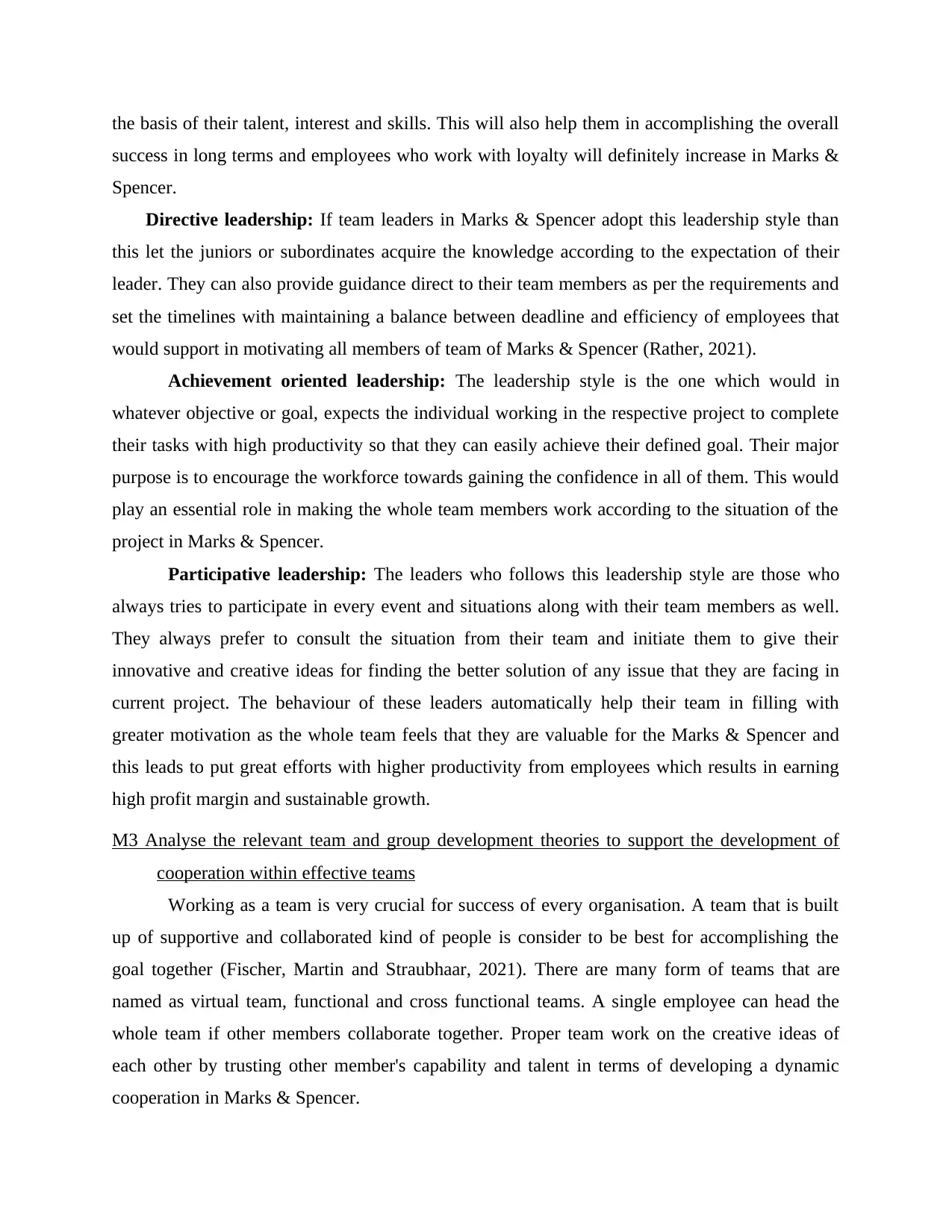
the basis of their talent, interest and skills. This will also help them in accomplishing the overall
success in long terms and employees who work with loyalty will definitely increase in Marks &
Spencer.
Directive leadership: If team leaders in Marks & Spencer adopt this leadership style than
this let the juniors or subordinates acquire the knowledge according to the expectation of their
leader. They can also provide guidance direct to their team members as per the requirements and
set the timelines with maintaining a balance between deadline and efficiency of employees that
would support in motivating all members of team of Marks & Spencer (Rather, 2021).
Achievement oriented leadership: The leadership style is the one which would in
whatever objective or goal, expects the individual working in the respective project to complete
their tasks with high productivity so that they can easily achieve their defined goal. Their major
purpose is to encourage the workforce towards gaining the confidence in all of them. This would
play an essential role in making the whole team members work according to the situation of the
project in Marks & Spencer.
Participative leadership: The leaders who follows this leadership style are those who
always tries to participate in every event and situations along with their team members as well.
They always prefer to consult the situation from their team and initiate them to give their
innovative and creative ideas for finding the better solution of any issue that they are facing in
current project. The behaviour of these leaders automatically help their team in filling with
greater motivation as the whole team feels that they are valuable for the Marks & Spencer and
this leads to put great efforts with higher productivity from employees which results in earning
high profit margin and sustainable growth.
M3 Analyse the relevant team and group development theories to support the development of
cooperation within effective teams
Working as a team is very crucial for success of every organisation. A team that is built
up of supportive and collaborated kind of people is consider to be best for accomplishing the
goal together (Fischer, Martin and Straubhaar, 2021). There are many form of teams that are
named as virtual team, functional and cross functional teams. A single employee can head the
whole team if other members collaborate together. Proper team work on the creative ideas of
each other by trusting other member's capability and talent in terms of developing a dynamic
cooperation in Marks & Spencer.
success in long terms and employees who work with loyalty will definitely increase in Marks &
Spencer.
Directive leadership: If team leaders in Marks & Spencer adopt this leadership style than
this let the juniors or subordinates acquire the knowledge according to the expectation of their
leader. They can also provide guidance direct to their team members as per the requirements and
set the timelines with maintaining a balance between deadline and efficiency of employees that
would support in motivating all members of team of Marks & Spencer (Rather, 2021).
Achievement oriented leadership: The leadership style is the one which would in
whatever objective or goal, expects the individual working in the respective project to complete
their tasks with high productivity so that they can easily achieve their defined goal. Their major
purpose is to encourage the workforce towards gaining the confidence in all of them. This would
play an essential role in making the whole team members work according to the situation of the
project in Marks & Spencer.
Participative leadership: The leaders who follows this leadership style are those who
always tries to participate in every event and situations along with their team members as well.
They always prefer to consult the situation from their team and initiate them to give their
innovative and creative ideas for finding the better solution of any issue that they are facing in
current project. The behaviour of these leaders automatically help their team in filling with
greater motivation as the whole team feels that they are valuable for the Marks & Spencer and
this leads to put great efforts with higher productivity from employees which results in earning
high profit margin and sustainable growth.
M3 Analyse the relevant team and group development theories to support the development of
cooperation within effective teams
Working as a team is very crucial for success of every organisation. A team that is built
up of supportive and collaborated kind of people is consider to be best for accomplishing the
goal together (Fischer, Martin and Straubhaar, 2021). There are many form of teams that are
named as virtual team, functional and cross functional teams. A single employee can head the
whole team if other members collaborate together. Proper team work on the creative ideas of
each other by trusting other member's capability and talent in terms of developing a dynamic
cooperation in Marks & Spencer.
Paraphrase This Document
Need a fresh take? Get an instant paraphrase of this document with our AI Paraphraser
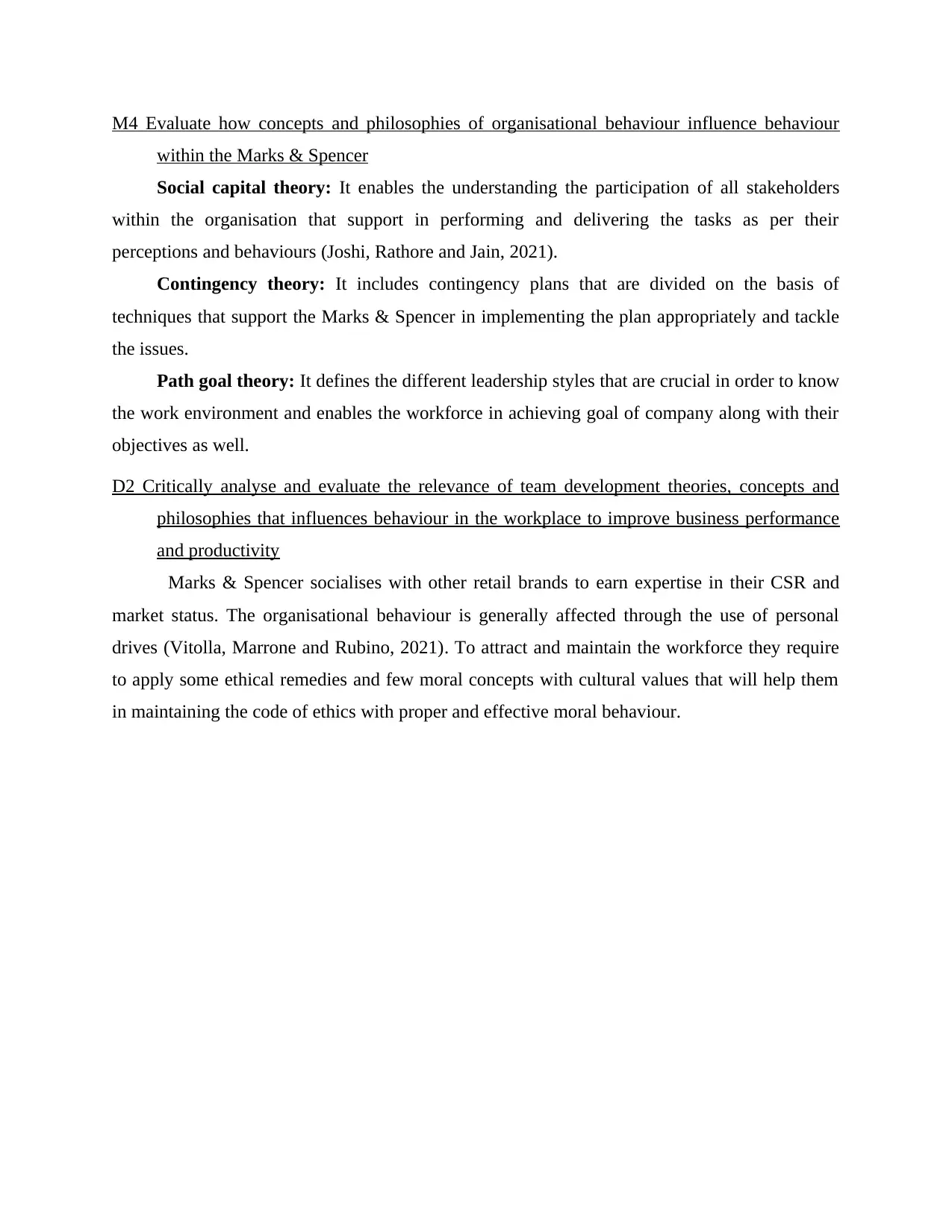
M4 Evaluate how concepts and philosophies of organisational behaviour influence behaviour
within the Marks & Spencer
Social capital theory: It enables the understanding the participation of all stakeholders
within the organisation that support in performing and delivering the tasks as per their
perceptions and behaviours (Joshi, Rathore and Jain, 2021).
Contingency theory: It includes contingency plans that are divided on the basis of
techniques that support the Marks & Spencer in implementing the plan appropriately and tackle
the issues.
Path goal theory: It defines the different leadership styles that are crucial in order to know
the work environment and enables the workforce in achieving goal of company along with their
objectives as well.
D2 Critically analyse and evaluate the relevance of team development theories, concepts and
philosophies that influences behaviour in the workplace to improve business performance
and productivity
Marks & Spencer socialises with other retail brands to earn expertise in their CSR and
market status. The organisational behaviour is generally affected through the use of personal
drives (Vitolla, Marrone and Rubino, 2021). To attract and maintain the workforce they require
to apply some ethical remedies and few moral concepts with cultural values that will help them
in maintaining the code of ethics with proper and effective moral behaviour.
within the Marks & Spencer
Social capital theory: It enables the understanding the participation of all stakeholders
within the organisation that support in performing and delivering the tasks as per their
perceptions and behaviours (Joshi, Rathore and Jain, 2021).
Contingency theory: It includes contingency plans that are divided on the basis of
techniques that support the Marks & Spencer in implementing the plan appropriately and tackle
the issues.
Path goal theory: It defines the different leadership styles that are crucial in order to know
the work environment and enables the workforce in achieving goal of company along with their
objectives as well.
D2 Critically analyse and evaluate the relevance of team development theories, concepts and
philosophies that influences behaviour in the workplace to improve business performance
and productivity
Marks & Spencer socialises with other retail brands to earn expertise in their CSR and
market status. The organisational behaviour is generally affected through the use of personal
drives (Vitolla, Marrone and Rubino, 2021). To attract and maintain the workforce they require
to apply some ethical remedies and few moral concepts with cultural values that will help them
in maintaining the code of ethics with proper and effective moral behaviour.
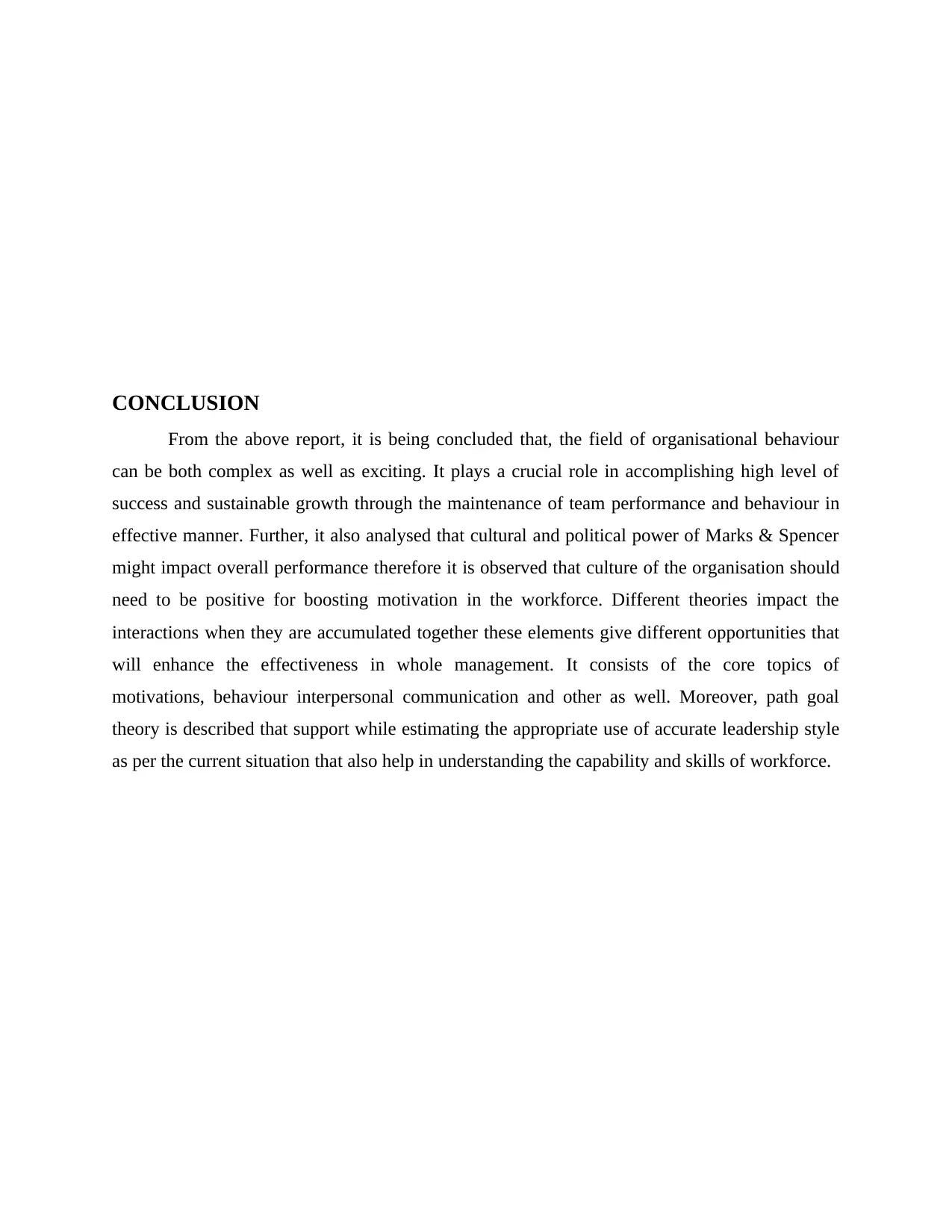
CONCLUSION
From the above report, it is being concluded that, the field of organisational behaviour
can be both complex as well as exciting. It plays a crucial role in accomplishing high level of
success and sustainable growth through the maintenance of team performance and behaviour in
effective manner. Further, it also analysed that cultural and political power of Marks & Spencer
might impact overall performance therefore it is observed that culture of the organisation should
need to be positive for boosting motivation in the workforce. Different theories impact the
interactions when they are accumulated together these elements give different opportunities that
will enhance the effectiveness in whole management. It consists of the core topics of
motivations, behaviour interpersonal communication and other as well. Moreover, path goal
theory is described that support while estimating the appropriate use of accurate leadership style
as per the current situation that also help in understanding the capability and skills of workforce.
From the above report, it is being concluded that, the field of organisational behaviour
can be both complex as well as exciting. It plays a crucial role in accomplishing high level of
success and sustainable growth through the maintenance of team performance and behaviour in
effective manner. Further, it also analysed that cultural and political power of Marks & Spencer
might impact overall performance therefore it is observed that culture of the organisation should
need to be positive for boosting motivation in the workforce. Different theories impact the
interactions when they are accumulated together these elements give different opportunities that
will enhance the effectiveness in whole management. It consists of the core topics of
motivations, behaviour interpersonal communication and other as well. Moreover, path goal
theory is described that support while estimating the appropriate use of accurate leadership style
as per the current situation that also help in understanding the capability and skills of workforce.
⊘ This is a preview!⊘
Do you want full access?
Subscribe today to unlock all pages.

Trusted by 1+ million students worldwide
1 out of 14
Related Documents
Your All-in-One AI-Powered Toolkit for Academic Success.
+13062052269
info@desklib.com
Available 24*7 on WhatsApp / Email
![[object Object]](/_next/static/media/star-bottom.7253800d.svg)
Unlock your academic potential
Copyright © 2020–2026 A2Z Services. All Rights Reserved. Developed and managed by ZUCOL.


